Heavy snow, dangerous cold bite northeastern US
Updated: 2014-01-04 02:35
(Agencies)
|
||||||||
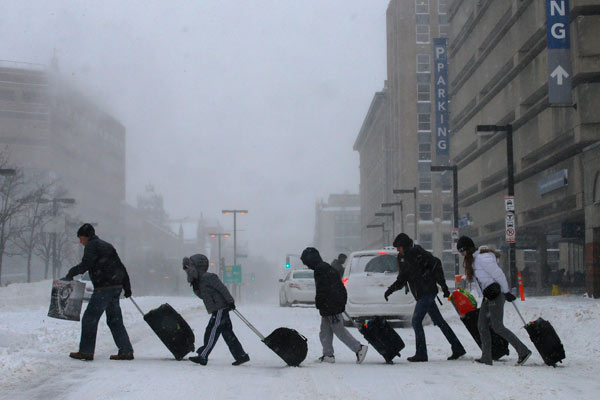 |
|
Travelers leave the Back Bay train and subway station during a winter nor'easter snow storm in Boston, Massachusetts January 3, 2014. [Photo/Agencies] |
A heavy snowstorm and dangerously low temperatures gripped the northeastern United States on Friday, delaying flights, paralyzing road travel and closing schools and government offices across the region.
Boston was hardest-hit by the first major winter storm of 2014, getting nearly 14 inches of snow, while some towns north of New England's largest city saw close to two feet of accumulation.
Snow and cold stretched from the lower Mississippi Valley to the Atlantic coast, with Washington and New York's morning commutes also hampered by several inches (cm) of fresh powder.
Meteorologists said the snow would taper off across much of the region by late morning, but dangerously cold conditions were expected to linger into Saturday. The National Weather Service said the mass of Arctic air would drop temperatures to 20 to 30 degrees Fahrenheit (11-17 C) below normal, with record lows possible in some areas on Friday.
"Over the next 24 hours we are going to see temperatures like we haven't seen in quite a while," said Peter Judge, a spokesman for the Massachusetts Emergency Management Agency. "Parts of the state are going to see temperatures 20 degrees below zero (F/-29 C) - not with wind-chill, real temperatures. It's going to be problematic."
Washington received more than 2 inches of snow, Baltimore some 3 to 6 inches, Philadelphia roughly 5 inches, Hartford 6 to 10 inches and Boston some 14 inches.
Some 1,868 US flights were canceled and 1,410 were delayed early on Friday, according to FlightAware.com, which tracks air traffic.Newark Liberty International Airport, LaGuardia Airport in New York and Philadelphia International Airport reported the most canceled departures.
New York's John F. Kennedy International Airport resumed operations on Friday morning after poor visibility had earlier forced it to close.
The United Nations in New York and federal courts in New Jersey shut down, and New York public schools and the City University of New York closed. Schools were also closed in Hoboken and Jersey City, in New Jersey, and in Boston and Providence, Massachusetts.
Connecticut Governor Dannel Malloy told CNN Friday morning that most schools and colleges in the state were closed. The governors of New York and New Jersey declared states of emergency.
'Not too happy'
The storm posed the first major challenge to Bill de Blasio, the newly elected mayor of New York. He said nearly 2,500 snow plows were on the streets of the biggest US city as of early Friday, with the top accumulations 6.5 inches.
De Blasio posted a photo of himself on his Twitter feed, shoveling the walk in front of his Brooklyn brownstone. He urged New Yorkers to stay home, saying, "This has been and remains a dangerous storm."
Some New Yorkers grumbled about the city's response.
"I'm sure mayor de Blasio is doing what he can, but a lot of the streets haven't been cleared at all and I'm not too happy about that," said Anesha Jones, 26, as she walked through Brooklyn to her job as a bank teller. She added that bus and subway delays added an hour to her regular commute.
Others took the storm in stride.
"It's winter. It snowed. It happens," said Mark Kulpa as he shoveled a sidewalk outside his Brooklyn workplace.
He said the response was better than a Christmas 2010 blizzard, where then-Mayor Michael Bloomberg came under heavy criticism for the city's slow response while he was out of town on vacation.
"At least they are out plowing and spreading salt. That's already a step up," Kulpa said. "But really, what can you say in two days and just after a big storm?"
New York Governor Andrew Cuomo said the storm had little impact on New York City's transportation network, but blizzard-like conditions meant rail service on Long Island would run on weekend schedules.
In Massachusetts, 3,338 crews were clearing roads, with 999 working on the heavily hit North Shore district alone, the state Department of Transportation said.
In Boston, downtown was sparsely populated, with many workers heeding Governor Deval Patrick's suggestion to stay home and avoid traveling on icy roadways.
In Washington, the Office of Personnel Management told hundreds of thousands of federal workers they could work from home or take an unscheduled leave because of the storm.
The storm was responsible for at least two deaths.
Police recovered the body of a 71-year-old woman who had wandered out in the rural western New York State town of Byron on Thursday night, improperly dressed for the single-digit temperatures, according to the Genesee County Sheriff's Office.
A Philadelphia city worker was killed after a machine he was using was crushed by a mound of de-icing rock salt, media said.
Massachusetts officials were also watching for possible coastal flooding in communities including the wealthy town of Scituate, located about 30 miles south of Boston, and parts of the Cape Cod beach resort areas.
Some residents of low-lying areas evacuated their homes overnight ahead of the last high tide, which came at midnight (0500 GMT), with more evacuations expected ahead of the next high tide at noon (1700 GMT).

 Heavy snow, dangerous cold bite northeastern US
Heavy snow, dangerous cold bite northeastern US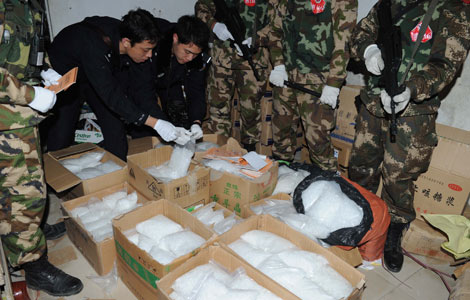
 Major meth ring rooted out in Guangdong raid
Major meth ring rooted out in Guangdong raid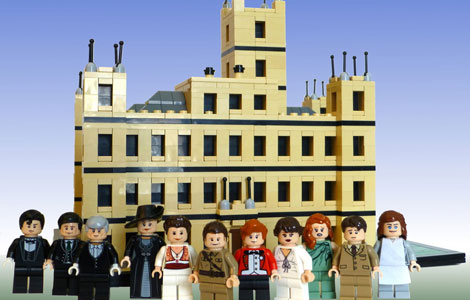
 The Lego version of Downton Abbey
The Lego version of Downton Abbey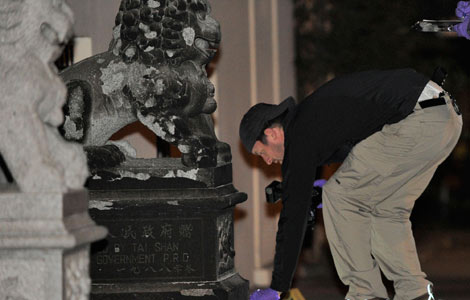
 Police probe fire attack on Chinese consulate
Police probe fire attack on Chinese consulate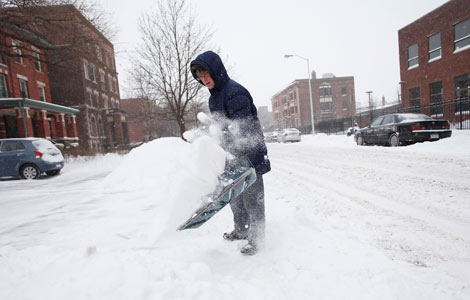
 Powerful storm brings Arctic cold, snow to US
Powerful storm brings Arctic cold, snow to US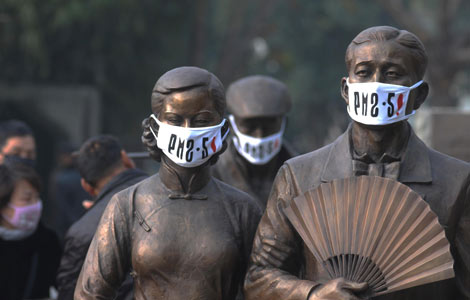
 Beijing sees little improvement in air quality
Beijing sees little improvement in air quality
 125th Rose Parade celebrated in US
125th Rose Parade celebrated in US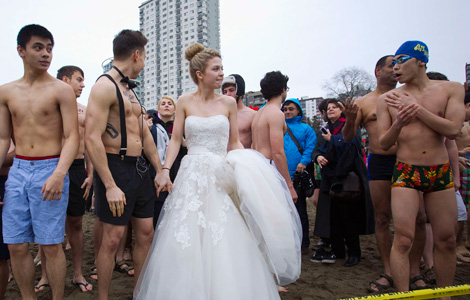
 Cold doesn't dissuade 'Polar Bear Swimmers'
Cold doesn't dissuade 'Polar Bear Swimmers'
Most Viewed
Editor's Picks

|

|

|

|

|

|
Today's Top News
China to overtake US as biggest goods trader
Heavy snow bites northeastern US
Currency tax under consideration
PMI falls to lowest for four months
Couples rush to marry on date of 'lifetime love'
Air purifiers added to gift wish list from US
FBI: Consulate fire not terrorist act
As Obamacare begins, critics launch new assault
US Weekly

|

|






